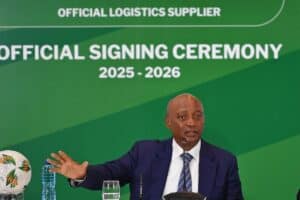During his discussion with Putin, Ramaphosa repeatedly used the word “war” and asked for both countries to respect territorial sovereignty.

President Cyril Ramaphosa displayed an unwavering statesmanship when he stood up to Russian strongman Vladimir Putin, telling him that his country’s invasion of Ukraine is actually “war”, a word Russia has studiously avoided.
Experts say his forthright manner with Putin showed the international community that South Africa was truly nonaligned and, while the peace mission itself may not succeed, South Africa would benefit from an improved international image.
In what many saw as balancing his tough “don’t bully us” stance towards the United States on the same war, Ramaphosa’s uncompromising approach during his meeting with Putin at St Petersburg shocked many, probably even the Russian leader, who has called the invasion a “special military operation”, a deliberate attempt to downplay the attack.
‘War’
During his discussion with Putin, Ramaphosa repeatedly used the word “war” and asked for both countries to respect territorial sovereignty, a unequivocal message to Putin, as leader of the invading nation, that he had violated this central provision of the United Nations Charter.
In his weekly online newsletter yesterday, the president described peace talks with the two countries as “historic”, although his opponents criticised him for the visit, which was yet to yield results.
Ramaphosa said the African mission he led had put forward a 10-point plan which included de-escalation of the conflict, the recognition of countries’ sovereignty, unimpeded grain exports through the Black Sea and sending prisoners of war and children back to their countries of origin.
Nonalignment
Dirk Kotzé, a professor of politics at the University of South Africa, said Ramaphosa was trying to demonstrate that South Africa really was nonaligned by being tougher on Putin than on Ukraine.
The proposals he presented to Putin and his Ukrainian counterpart, Volodymyr Zelensky, put pressure on Russia to back off. “This is a deliberate move to show South Africa isn’t pro-Russia. This, itself, is important and would help change South Africa’s image of being seen as pro-Russian,” he said.
Kotzé said the African mission’s proposals that Ukraine’s territorial sovereignty should be respected and that the children taken by Russia during the war should be returned home would give credibility to the process and legitimise South Africa’s role as peacemaker and not a Russian ally.
‘Pro-Putin peace plan’
“That is certain not a pro-Putin peace plan. Ramaphosa wants to … appear more even-handed.” His view was shared by Zelenky’s former economics advisor Tymofiy Mylovanov, who tweeted: “I listened to this plan today and surprisingly it has many pro-Ukrainian items.”
Mylovanov was also Zelensky’s minister of economy in 2019 and 2020 and is an associate professor at University of Pittsburgh. The war in Ukraine has had a negative effect on South Africa because of its nonaligned stance, which was interpreted by the West as being pro-Russia.
The US wanted South Africa to condemn Russia and vote against the invasion at the United Nations, which Pretoria was reluctant to do. “This had a negative effect, but this time [Ramaphosa] wants to make sure there is no further negative effect on South Africa.
NOW READ: Ramaphosa in Russia: From Zelensky to Putin, a diplomatic peace sprint
Mandela image
Ramaphosa wants to portray a Mandela-like image of South Africa – a country that wants peace and security in the world,” Kotze said.
The mission started a serious dialogue to end the war. This was unlike in the past when both sides only focused on fighting and reinforcing their armies with the assistance of their allies.
The expert was pessimistic about the mission’s ability to end the war, saying that was an un- realistic outcome. Real talks were possible only once there was a deadlock, where both sides had no hope of moving forward in the war and when each wanted to get out of the conflict.
“At the moment the two sides are nowhere [near] that stage. To encourage talks now is unrealistic,” Kotzé said. “But the African mission has been able to put the idea of dialogue on the table whereas previously it had been about how to strengthen each side in the war.
“There had been previous attempts to mediate by Türkiye and proposals by China, but those had also not yielded results because the focus was on fighting, encouraged their allies.
“What the [African] mission did was to direct both sides to look at the resolution of the conflict, rather than only the war. Ramaphosa and the mission can take credit for that.”
READ MORE: Ramaphosa in Russia: South Africa is not a Moscow lackey
Support Local Journalism
Add The Citizen as a Preferred Source on Google and follow us on Google News to see more of our trusted reporting in Google News and Top Stories.






